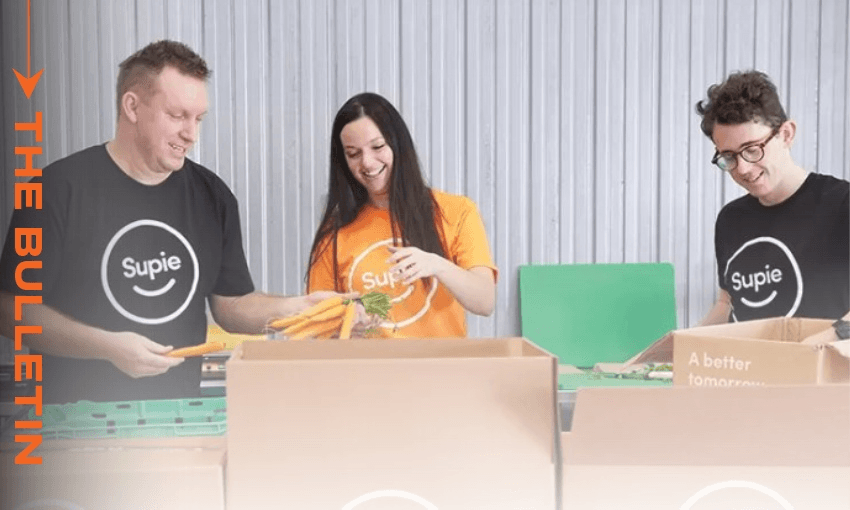Grocery start up Supie went into voluntary administration yesterday. Talk has turned to the difficulties of taking on the supermarket duopoly as the grocery commissioner says a fix won’t be quick, writes Anna Rawhiti-Connell in this excerpt from The Bulletin, The Spinoff’s morning news round-up. To receive The Bulletin in full each weekday, sign up here.
A fast fall
Sarah Balle’s online grocery company Supie had become something of a symbol of resistance — a David against the Goliaths. A cost of living crisis, a desire to see more competition in our grocery sector and Balle’s advocacy made the company a heroic alternative to the dominant duopoly. In July, the company revealed plans to open high-tech physical stores in the coming year. Two weeks ago, Balle revealed she was confident (paywalled) the start up was on track to reach profitability and 100,000 members in the next 12 months, with 72,000 members as of October. Just last week, Balle told Stuff the small retailer had expansion plans beyond Auckland, Waikato and Tauranga. Six days ago, Supie posted a job ad on Seek for a produce business manager. Yesterday it was announced that the company was being put into voluntary administration after it failed to raise $3m from investors in August with $1.1m already committed. According to the NBR’s Hamish McNicol (paywalled), a key investor pulled support. Two board members resigned last Friday.
Supie staff unlikely to be paid
There is undoubtedly more to come out in the wash, but voluntary administrator PWC’s Richard Nacey said early work indicates 400 creditors are owed about $3m. The chances of the 120 Supie staff being paid for the last two weeks of work, their annual leave entitlements or redundancy pay, are slim. Staff members have told the Herald (paywalled) that all company assets are registered under Supie, while staff were paid by another company, Workerly. Supie supplier Neat Meat is owed $14k. Speaking to RNZ’s Checkpoint last night, managing director Simon Eriksen didn’t sound confident about recovering the money but did say they’d reached out to Supie’s employees to say Neat Meat was looking for staff and were talking to some of them now about possible employment.
‘All discussion should centre on a structural break up of the supermarkets’
It hasn’t taken long for talk of the lack of competition and the duopoly to rear its head. Balle was a vocal advocate for the government doing more to support smaller players, speaking to BusinessDesk (paywalled) about that two weeks ago. Competition advocate Tex Edwards says that while he did not want to comment on Supie’s funding push and whether the startup was undercapitalised, “all discussion should centre on a structural break up of the supermarkets.” Edwards has previously suggested it would take at least $1.1b in capital to take on the incumbent players, Foodstuffs and Woolworths, who have a combined market share of 90%. In accidental timing that seemed a little too on the nose, new Grocery Commissioner Pierre van Heerden outlined his priorities for fostering competition in New Zealand’s $25 billion supermarket sector yesterday. Speaking to Stuff’s Aimee Shaw, van Heerden, who has been on the job for just over 100 days, said he was focused on fixing misleading pricing, reducing the influence of suppliers and lowering barriers to entry for new players. van Heerden says he knew there was a lot of expectation that he should bring about change fast, but it needed to be sustainable.
Old habits die hard?
While shopping for groceries online surged during Covid lockdowns, and Countdown/Woolworths NZ has recently relaunched a failed grocery delivery service powered by Uber, questions are emerging overseas about online grocery habits and growth potential in a post-pandemic world amid a cost of living crisis. In Australia, online grocery shopping peaked during the pandemic, with consumers spending about $4.4b every month online. That’s back to between $3.6 to $3.7b every month. Australians also have access to e-commerce giant Amazon for groceries. A YouGov survey in late 2022 showed that the one category bucking the online shopping trend was grocery, with 60% of people across multiple countries saying they preferred to shop in person. The Business Times reported (paywalled) on the failure of online grocery delivery businesses in Singapore and Indonesia in January this year, concluding that despite the convenience it offers consumers, it was yet to prove itself as a good investment.


